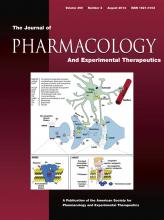Abstract
Both preclinical evidence and clinical evidence suggest that α7 nicotinic acetylcholine receptor activation (α7nAChR) improves cognitive function, the decline of which is associated with conditions such as Alzheimer’s disease and schizophrenia. Moreover, allosteric modulation of α7nAChR is an emerging therapeutic strategy in an attempt to avoid the rapid desensitization properties associated with the α7nAChR after orthosteric activation. We used a calcium assay to screen for positive allosteric modulators (PAMs) of α7nAChR and report on the pharmacologic characterization of the novel compound RO5126946 (5-chloro-N-[(1S,3R)-2,2-dimethyl-3-(4-sulfamoyl-phenyl)-cyclopropyl]-2-methoxy-benzamide), which allosterically modulates α7nAChR activity. RO5126946 increased acetylcholine-evoked peak current and delayed current decay but did not affect the recovery of α7nAChRs from desensitization. In addition, RO5126946’s effects were absent when nicotine-evoked currents were completely blocked by coapplication of the α7nAChR-selective antagonist methyl-lycaconitine. RO5126946 enhanced α7nAChR synaptic transmission and positively modulated GABAergic responses. The absence of RO5126946 effects at human α4β2nAChR and 5-hydroxytryptamine 3 receptors, among others, indicated selectivity for α7nAChRs. In vivo, RO5126946 is orally bioavailable and brain-penetrant and improves associative learning in a scopolamine-induced deficit model of fear conditioning in rats. In addition, procognitive effects of RO5126946 were investigated in the presence of nicotine to address potential pharmacologic interactions on behavior. RO5126946 potentiated nicotine’s effects on fear memory when both compounds were administered at subthreshold doses and did not interfere with procognitive effects observed when both compounds were administered at effective doses. Overall, RO5126946 is a novel α7nAChR PAM with cognitive-enhancing properties.
Footnotes
- Received November 20, 2013.
- Accepted May 16, 2014.
↵1 Current affiliation: Molecular Biosciences, School of Veterinary Medicine, University of California, Davis, California.
↵2 Current affiliation: SRI International, Menlo Park, California.
↵3 Current affiliation: Gilead Sciences Inc., Palo Alto, California.
↵4 Current affiliation: Chemistry & Drug Discovery Consulting LLC, Portland, Oregon.
↵5 Current affiliation: Principia Biopharma, South San Francisco, California.
↵6 Current affiliation: Janssen Research and Development, La Jolla, California.
↵7 Current affiliation: Acorda Therapeutics, Inc., Ardsley, New York.
All studies were funded by F. Hoffmann La Roche.
↵
 This article has supplemental material available at jpet.aspetjournals.org.
This article has supplemental material available at jpet.aspetjournals.org.
- Copyright © 2014 by The American Society for Pharmacology and Experimental Therapeutics
JPET articles become freely available 12 months after publication, and remain freely available for 5 years.Non-open access articles that fall outside this five year window are available only to institutional subscribers and current ASPET members, or through the article purchase feature at the bottom of the page.
|







